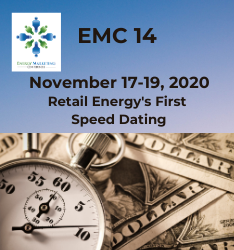|
|
|
|
|
Pennsylvania PUC Initial Decision Would Find Several Electric Utilities' Billing Service To Be "Discriminatory" Against Retail Suppliers
The following story is brought free of charge to readers by EC Infosystems, the exclusive EDI provider of EnergyChoiceMatters.com
An initial decision from a Pennsylvania ALJ would find that the provision of on-bill billing services by Met-Ed, Penelec, Penn Power and West Penn Power (FirstEnergy EDCs) for non-basic non-commodity products and services to themselves and their affiliates but not to other suppliers in their system (such as retail suppliers) is, "unreasonably discriminatory."
The initial decision would direct that, "The EDCs must either provide on-bill billing for all suppliers’ non-basic, non-commodity products and services or to no one at all, including themselves and their affiliates."
Under the initial decision, the EDCs would be given 60 days from the entry date of a final order to report to the Commission’s Bureau of Technical Utility Services (TUS) their methodology for coming into compliance with Sections 1502 and 2804(6) of the Code and Chapter 56.
The initial decision does not represent final agency action. Parties may file exceptions to the initial decision.
The initial decision addresses a complaint filed against the EDCs by Interstate Gas Supply, Inc. d/b/a, IGS Energy, Direct Energy Services, LLC, and Shipley Choice, LLC d/b/a Shipley Energy.
The initial decision generally follows the precedent set in a recent PUC case which found that Columbia Gas's practice of providing "on-bill" billing for non-utility services to only two select providers is, "discriminatory." See our prior story for more details on the Columbia case
The ALJ noted that the EDCs, "have a long history of offering non-commodity products and services, such as surge protection and line repair programs, to their customers."
The ALJ noted that the EDCs do not permit any electric generation supplier (EGS), affiliate, or other third party to include charges for their non-commodity products and services on the EDCs’ bills
"In other words, the EDCs provide one service to themselves or their affiliates that they do not provide to other entities," the ALJ said
In a finding of fact, the ALJ would find that, "Including charges for non-commodity services in the total amount owed on a utility bill provides a significant competitive advantage."
"Substantial
record evidence demonstrates that the companies do not provide the suppliers’ rates, terms of
access and conditions that are comparable to their own use of the system. The electric
distribution companies have, therefore, made an unreasonable preference or advantage and have
established or maintained an unreasonable difference as to service in violation of the Public
Utility Code," the ALJ said
"[T]he EDCs are treating entities other than themselves and their affiliates differently than they treat themselves or their affiliates based on the group, class or category to which they belong, rather than on merit, by not allowing the EGSs to have access to on-bill billing for their non-commodity non-basic products and services," the ALJ said
While the EDCs had argued that the complaint represented a collateral attack on the PUC's prior acceptance of the supplier coordination tariffs prohibiting EGSs from billing non-commodity services via utility consolidated bills, the ALJ said, "the EGSs have provided the higher demonstration of proof required to show that the EDCs’ prohibition of the EGSs’ on-bill billing of non-commodity charges is unjust and unreasonable in this case because the prohibition violates Sections 1502 and 2804(6) of the Public Utility Code."
"As a preliminary matter, neither the Commission’s approval of the EDCs’ prior DSP [default service plan], nor the EDCs’ Commission-approved tariffs, trump Sections 1502 or 2804(6) [relating to non-discriminatory service] of the Public Utility Code as enacted by the Pennsylvania General Assembly," the ALJ said
The EDCs had also argued that they were not discriminating against EGSs since no EGSs at all are permitted to use on-bill billing (and thus all EGSs are treated equally), and only EDCs and non-EGS EDC affiliates may use the bills
The ALJ rejected this argument as a too narrow reading of the relevant statute.
"The prohibition against unreasonable preference or advantage applies to 'any person, corporation or municipal corporation,' which includes the EDCs themselves," the ALJ said
"[T]he EDCs’ provision of on-bill billing for their own non-commodity services while refusing to provide the same service to the EGSs is discriminatory," the ALJ said
The EDCs also argued that the discrimination is permissible because it is reasonable and warranted to have different standards
Specifically, the EDCs had argued that there are significant implementation challenges, consumer protection concerns, risks and costs that justify continuing the prohibition of utility consolidated billing for EGS non-commodity services
The ALJ noted that, "In particular, the EDCs noted that significant information technology changes would be required to implement the EGSs’ requested relief; there is no cost recovery methodology for the system, and procedural changes are required to allow the EDCs to bill for non-commodity products and services on behalf of EGSs; EGSs cannot participate in the EDCs’ purchase of receivables (POR) program for its commodity charges while excluding its non-commodity product and service charges; the EDCs have no billing procedures in place or independent ability to ensure that the charges are not the basis for service termination; and, the EDCs billing EGS non-commodity products and services would create significant customer confusion and increased litigation and risk for the EDC."
The ALJ rejected these arguments
"Although the EDCs raise reasonable implementation concerns, none of them justify allowing the EDCs to continue their unreasonable discriminatory practices. For example, it is reasonable to expect that making the changes required to ensure that the EDCs’ practices are not discriminatory may be burdensome or costly. These costs and burdens, however, are not unduly burdensome but, rather, are warranted to ensure that the EDCs’ practices comply with Sections 1502 and 2804(6) of the Public Utility Code. Similarly, to the extent that the EDCs’ tariffs may also need to be modified or billing procedures created to accommodate the changed practice, such efforts are also required and necessary to ensure that the EDCs’ practices comply with Sections 1502 and 2804(6) of the Public Utility Code. Any customer confusion or increased litigation can also be mitigated by consumer education efforts, among other things. Certainly, such efforts have been present throughout the entire transformation of the electric utility industry in Pennsylvania over the past two decades since the Act, supra, was enacted. While it is reasonable to seek to avoid or minimize any unnecessary costs, burdens, confusion, etc. to ensure the provision of safe and reliable electric service at just and reasonable rates, such efforts do not outweigh making the necessary changes to ensure that such service is not unreasonably discriminatory. Such efforts should be taken with regard to the issues raised in this case as well, and the EDCs’ arguments to the contrary will be rejected," the ALJ said
Citing the PUC's recent decision regarding Columbia Gas noted above, the ALJ noted that a utility's billing practice constitutes a "service" under 66 Pa.C.S. § 102, and is subject to the Commission’s jurisdiction to determine whether the practice violates Sections 1502 and 2203(4), 66 Pa.C.S. §§ 1502 and 2203(4) prohibiting discrimination and anti-competitive practices in the provision of service.
However, similar to the Columbia decision, the ALJ would not order the EDCs to allow EGSs to have access to on-bill billing for non-commodity services. Rather, as noted above, the ALJ would direct the EDCs to show how they would come into compliance with the non-discrimination provisions of the code
The ALJ cited consumer protection concerns associated with the billing of EGS non-commodity charges on utility bills for adopting this approach
The OCA noted, among other things, the various non-commodity, non-basic products and services provided by the EGSs and questioned the appropriateness for such products to be placed on a regulated electric utility bill, noting the volume of the potential programs and separate charges that could be included on EDC bills. The OCA also said it may not be clear to customers that they do not have to pay the total amount due on the bill to avoid disconnection when the total includes non-commodity services
"The issues raised by the OCA are meritorious but do not warrant denying the EGSs’ complaints. Instead, to the extent that the EDCs wish to continue to provide the on-bill billing services to themselves or their affiliates for non-basic, non-commodity products and services, the issues raised by the OCA must be addressed to ensure that the EDCs’ action both 1) comply with Sections 1502 and 2804(6) of the Public Utility Code and, at the same time, 2) comply with the Commission’s consumer protection regulations in Chapter 56," the ALJ said
"[T]he EDCs could also address their concerns regarding the significant implementation challenges they aver exist if they were required to allow all suppliers to have on-bill billing for non-basic, non-commodity products and services on their bills. As noted above, the EDCs raised concerns regarding implementation challenges, increased risk to the companies and significant implementation costs if the EGSs’ complaint were sustained. The EDCs could address those issues in their report to TUS [Bureau of Technical Utility Services]," the ALJ said
Docket C-2019-3013805
ADVERTISEMENT Copyright 2010-20 Energy Choice Matters. If you wish to share this story, please
email or post the website link; unauthorized copying, retransmission, or republication
prohibited.
November 18, 2020
Email This Story
Copyright 2010-20 EnergyChoiceMatters.com
Reporting by Paul Ring • ring@energychoicematters.com
NEW Jobs on RetailEnergyJobs.com:
• NEW! -- Senior Energy Advisor
• NEW! -- Financial Analyst -- Retail Supplier -- DFW
• NEW! -- Sr. Energy Intelligence Analyst
• NEW! -- Channel Partner Sales Manager -- Retail Supplier
• NEW! -- Sr. Billing Analyst -- Retail Supplier
• NEW! -- Director of Regulatory Affairs -- Retail Supplier -- Houston
• NEW! -- Energy Pricing Analyst -- Houston
• NEW! -- Retail Energy Account Executive -- Houston
• NEW! -- Sr. Sales Executive -- Retail Supplier
|
|
|
|










